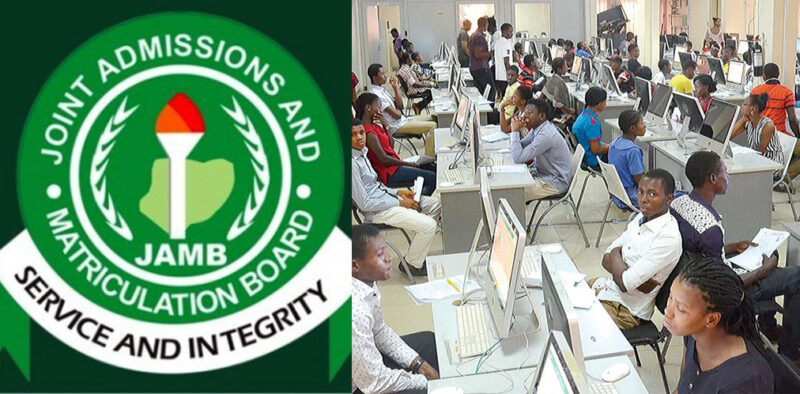Education
JAMB releases 2024 UTME original result slips (see how to print)

JAMB releases 2024 UTME original result slips (see how to print)
The Joint Admissions and Matriculation Board (JAMB) has officially announced the release of original result slips for candidates who participated in the 2024 Unified Tertiary Matriculation Examination (UTME).
This was revealed in a statement on JAMB verified X handle.
It stated, “Candidates who sat the 2024 Unified Tertiary Matriculation Examination (UTME) can now print their original result slips. These slips, which feature the candidate’s photograph and advanced security features.”
How to Print JAMB Original Result
Follow the steps below to print out the original UTME result on JAMB portal:
1. Login to your JAMB profile through https://efacility.jamb.gov.ng/.
2. Once logged in, you will be taken to a page where you will see all available services.
READ ALSO:
- Tinubu urges youth to shelve planned protest, await his response
- US Secret Service boss resigns over Trump shooting failures
- Protest against EFCC: Ede Poly expels 27 students, suspends 8
3. Click on “Print Result Slip”.
4. Review the details displayed on the Confirmation Page.
5. Select your desired payment method and proceed with the payment
6. After payment, login to jamb portal, click on My Payments you will see it in the menu sidebar. Then click on get status. If your payment is approved, click on CONTINUE.
7. You will be directed to the result printing page.
8. You will be asked to provide the following: Year of Exam and JAMB Registration Number.
9. After entering the information correctly, you can now print the Result Slip.
Once more it’s very important to note that the steps above will work since the JAMB Original result is officially out. You should also use a desktop computer or laptop, although it will work on some mobile phones. Finally, we recommend you use a Google Chrome browser.
JAMB releases 2024 UTME original result slips (see how to print)
Education
Ogun Gov Rewards Nigeria’s Best Primary School Teacher with Car, Bungalow

Ogun Gov Rewards Nigeria’s Best Primary School Teacher with Car, Bungalow

Ogun Gov Rewards Nigeria’s Best Primary School Teacher Solanke Francis Taiwo with Car and Bungalow
The Ogun State Governor, Dapo Abiodun, has honoured Mr Solanke Francis Taiwo, a primary school teacher at Ansa‑Ur‑Deen Main School I, Kemta Lawa, Abeokuta, with a brand new car and a two‑bedroom bungalow in recognition of his achievement as Nigeria’s Overall Best Primary School Teacher for the 2025/2026 academic year.
The presentation took place at the Governor’s Office in Oke‑Mosan, Abeokuta, with the Commissioner for Education, Science and Technology, Prof Abayomi Arigbagbu, and the ministry’s Permanent Secretary, Mr Oloko, in attendance. The gifts were part of a broader effort to motivate teachers, reward professional excellence, and highlight the state’s education reforms.
Speaking at the event, Prof Arigbagbu said the award demonstrates the effectiveness of the Ogun State Education Revitalisation Agenda, which is built on six pillars including curriculum enhancement, school administration, innovation, infrastructure, funding, and teachers’ welfare. “When you do things consistently and efficiently, you record results. This same teacher won the Ogun State Best Teacher Award in October before clinching the national award in Abuja. This confirms that our education sector has been truly revitalised,” he said.
READ ALSO:
- Police Bust Gang Armoury, Arrest Two Suspects in Delta
- Peter Obi Launches ‘Village Boys Movement’ to Rival Tinubu’s City Boys Ahead of 2027
- Woman Dies in Bandits’ Camp After Family Pays ₦25 Million Ransom

Ogun Gov Rewards Nigeria’s Best Primary School Teacher Solanke Francis Taiwo with Car and Bungalow
He highlighted the state’s successes in national competitions, including the JETS contests, where Ogun students won 18 out of 24 awards in one year, with a single student claiming nine prizes. The commissioner also noted that Ogun’s Technical and Vocational Education and Training (TVET) model and education digitisation initiatives have attracted attention from other states and received commendation from the Federal Government and the National Board for Technical Education.
Governor Abiodun reaffirmed his commitment to teacher development, pledging continuous support through workshops, seminars, digital learning platforms, and AI-powered instructional tools. He said the gifts of a car and bungalow are intended to inspire other educators to strive for excellence and innovation in their teaching.
In his remarks, Mr Solanke expressed gratitude to the governor and the education ministry for fostering an enabling environment for teaching and learning. He vowed to continue improving student learning outcomes and collaborating with colleagues to ensure that Ogun State remains a leader in education excellence.
“I feel fulfilled and honoured. I will continue to give my best and encourage fellow teachers to remain dedicated to nurturing the potential of every student,” he said.
The recognition of Mr Solanke reflects Ogun State’s strategic investment in education, commitment to teacher welfare, and the effectiveness of policies that have positioned the state as a model for academic excellence in Nigeria.
Ogun Gov Rewards Nigeria’s Best Primary School Teacher with Car, Bungalow
Education
Over 1.5 Million Candidates Registered as JAMB UTME Pin Vending Nears Deadline

Over 1.5 Million Candidates Registered as JAMB UTME Pin Vending Nears Deadline
The Joint Admissions and Matriculation Board (JAMB) has confirmed that more than 1.5 million candidates have registered for the 2026 Unified Tertiary Matriculation Examination (UTME), as the deadline for e‑PIN vending and registration rapidly approaches.
In a statement released in Abuja by the board’s Public Communication Advisor, Dr. Fabian Benjamin, the board said the sale of e‑PINs — required for candidates to proceed with registration at accredited centers — will close at midnight on Thursday, February 26, 2026, while actual registration at centres will end on Saturday, February 28, 2026.
According to JAMB, its daily registration capacity stands at 100,000 candidates, but most centres are currently operating at roughly 30 per cent capacity, indicating that a significant number of eligible candidates have yet to register. The board emphasised that there will be no extension of the registration window, explaining that the schedule aligns with the national examination calendar and is coordinated to allow other examination bodies to conduct their exercises without conflict.
READ ALSO:
- FG Seals Plateau Mine After 37 Killed in Toxic Gas Tragedy
- Troops Kill Five Kidnappers, Rescue Abducted Woman in Plateau
- Sowore Condemns Electoral Act 2026 as Threat to Nigeria’s Democracy
JAMB urged candidates to secure their e‑PINs early and complete registration at accredited CBT centres without delay. The board warned that last-minute registration could result in avoidable challenges and reiterated that it will not entertain appeals for deadline extensions.
The 2026 UTME is scheduled to hold from April 16 to April 25 and will determine admission into universities, polytechnics, and colleges of education across Nigeria. JAMB also assured candidates that all testing centres would have adequate security, technical support, and invigilation to ensure a smooth and credible examination process.
Education experts and stakeholders have encouraged candidates to register promptly and take advantage of preparatory resources offered online and at local centres. State education authorities have also organised orientation programmes to guide students through registration, examination, and post-UTME procedures.
JAMB continues to provide updates and guidance through its official portal and social media channels, ensuring that candidates have access to information about registration, examination procedures, and exam day requirements.
Over 1.5 Million Candidates Registered as JAMB UTME Pin Vending Nears Deadline
Education
BREAKING: Academic Activities Halted as ASUU Resumes Strike

BREAKING: Academic Activities Halted as ASUU Resumes Strike
The Academic Staff Union of Universities (ASUU), Taraba State University (TSU) branch, has resumed an indefinite strike, citing the failure of the Taraba State Government to honour agreements reached earlier with the union.
The industrial action comes weeks after ASUU suspended its earlier strike following negotiations held on January 17, 2025, a move the union said was done in good faith to allow the government time to meet its commitments. According to ASUU, those promises were not fulfilled, forcing lecturers to withdraw their services again.
In a statement issued in Jalingo, the ASUU TSU branch chairman, Joshua Garba Mbave, said the government failed to take practical and verifiable steps toward resolving the lingering issues affecting staff welfare.
READ ALSO:
- Ramadan Health Tips: Six Ways to Stay Hydrated While Fasting
- Tinubu Urges Senate to Confirm Yusuf for NAHCON, Marafa for INEC
- Galatasaray Stun Juventus 5–2 in UEFA Champions League
The union said its congress meeting held on February 18, 2026, reviewed developments since the suspension of the strike and unanimously agreed to resume the total, comprehensive, and indefinite strike.
ASUU listed several unresolved demands, including unpaid salary arrears, non-payment of Earned Academic Allowances, the absence of a functional pension scheme for university workers, and the failure to implement the 2025 ASUU–Federal Government agreement applicable to state-owned universities.
Dr. Mbave warned that the continued neglect of these issues has crippled staff morale, worsened economic hardship for lecturers, and disrupted academic stability at Taraba State University. He stressed that sustained dialogue with the Taraba State Government had produced no concrete outcome.
As a result of the renewed strike, academic activities at Taraba State University have been suspended indefinitely, with students advised to remain at home until further notice.
BREAKING: Academic Activities Halted as ASUU Resumes Strike
-

 International1 day ago
International1 day agoCanada Opens New Express Entry Draw for Nigerian Workers, Others
-

 News2 days ago
News2 days agoKorope Drivers Shut Down Lekki–Epe Expressway Over Lagos Ban (Video)
-

 Politics10 hours ago
Politics10 hours agoPeter Obi Launches ‘Village Boys Movement’ to Rival Tinubu’s City Boys Ahead of 2027
-

 Health3 days ago
Health3 days agoRamadan Health Tips: Six Ways to Stay Hydrated While Fasting
-

 News16 hours ago
News16 hours agoPolice to Arrest TikToker Mirabel After She Recants False Rape Claim
-

 Entertainment3 days ago
Entertainment3 days agoActress Destiny Etiko Breaks Silence on Alleged Nollywood Betrayal
-

 metro1 day ago
metro1 day agoOsun Awards 55.6km Iwo–Osogbo–Ibadan Road Project to Three Contractors
-

 International18 hours ago
International18 hours agoEpstein, Ex-Israeli PM Named in Alleged Profiteering From Boko Haram Crisis











